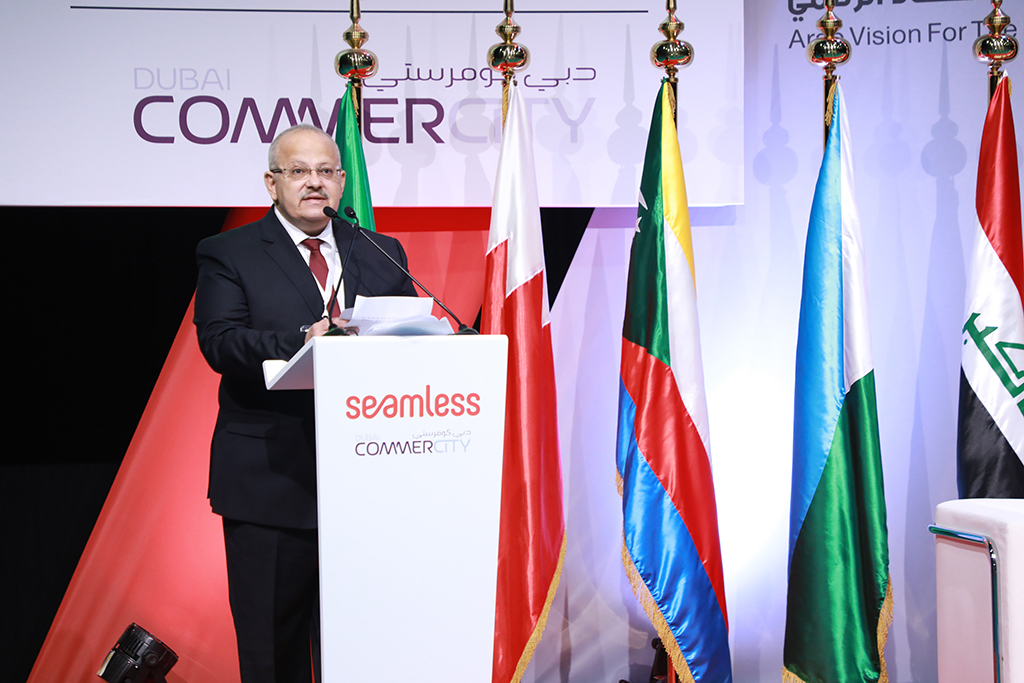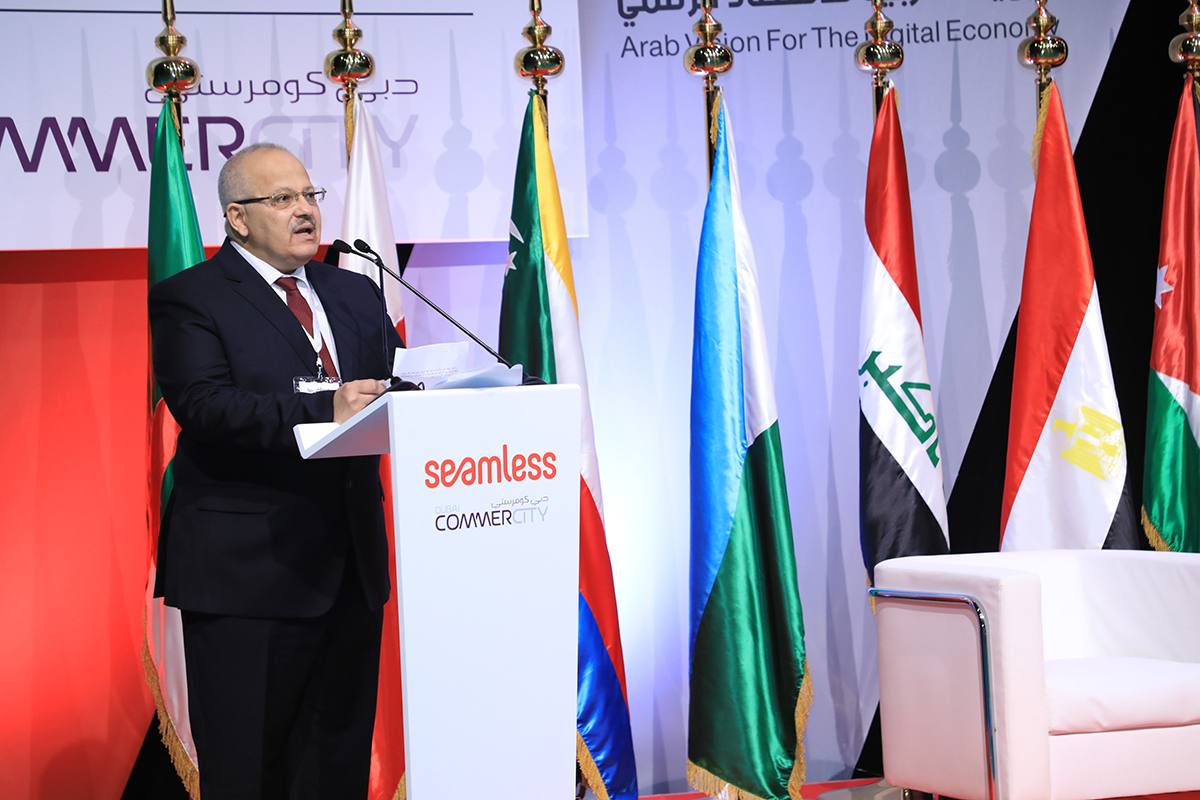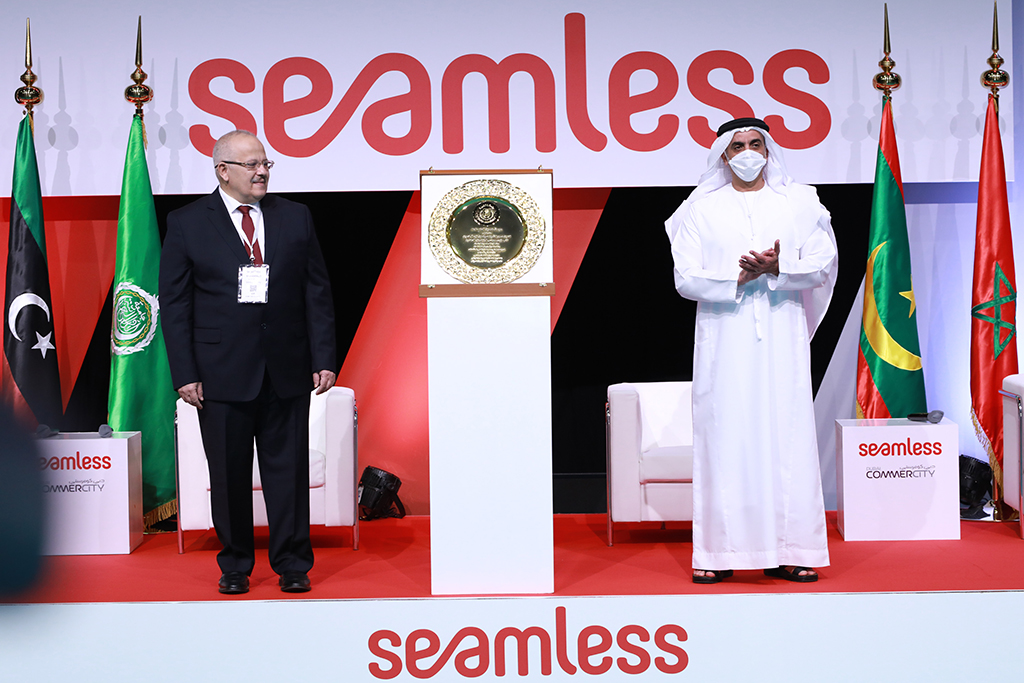
His Excellency Prof. Mohamed Othman Elkhosht, President of Cairo University, participated in the inaugural session of the “Seamless 2020 Digital Economy Technologies Conference and Exhibition”, which is being held at the World Trade Center in Dubai, under the title of his speech: The future of the digital economy.
Elkhosht praised the Arab vision of the digital economy and its role in developing digital concepts and practices in the Arab region and the emerging economy.
Dr. Mohamed Elkhosht said, “If we want to have a seat in the global economy, we must enhance the benefit of the growth of the digital economy; Because it can contribute significantly to achieving high and sustainable growth rates for all activities of the economy,” adding that this will only be done with the positive contribution of the telecommunications sector to the GDP, and the development of digital indicators in improving a number of essential files that are positively reflected on the economic situation, such as: improving Files of managing government services, achieving financial inclusion, and integrating the informal economy into the formal economy.
In his speech, the President of Cairo University indicated that there are five main pillars used to measure and evaluate the status of the digital economy, and they include: digital infrastructure, public digital platforms, digital financial services, digital business, and digital skills.
During his speech, Dr. Mohamed Elkhosht explained that the phenomenon of the digital economy has rapidly emerged in the economic literature since the beginning of the first decade of the twenty-first century as a new and rapidly growing phenomenon that works to change all economic activities, integrating data and the Internet in production processes and creating products, and the different consumption patterns of individuals. governments, capital formation, cash flows and cross-border financing.
The President of Cairo University spoke about the efforts of the Egyptian state and its institutions in digitizing the Egyptian economy, and noted the efforts of the Administrative Control Authority and the Ministry of Communications in Egypt’s digital transformation, referring to the decisions of the Central Bank that paved the way for digital transformation in the financial payments sector to reduce monetary transactions and facilitate the use of means and tools Electronic payment to confront the emerging crisis of the Corona virus, and he also referred to the significant role of the Ministry of Finance in working with the government financial management information system and electronic payment and collection systems for government receivables and payments.
Dr. Mohamed Elkhosht reviewed Cairo University’s plan to transform into a third-generation smart university that was announced three years ago in August 2017, most of which were achieved, most notably the completion of complete financial inclusion processes linked to electronic databases for all university employees, and connected to the Central Bank of Egypt. And the Ministry of Finance, and the launch of the world’s largest electronic smart platform for distance education and exams, and made great strides in introducing interactive screens for education and electronic test centers.
The President of Cairo University pointed to a number of basic challenges facing the growth of digital economy indicators, including ensuring the security and protection of data privacy, dealing with digital security risks, facing crises related to digital security risk management, and financing digital services and digital infrastructure.

Dr. Elkhosht also indicated the obstacles that may impede the current efforts adopted by governments aimed at the growth of digital services within the national economy, which are represented in the weak capabilities and skills of workers in the government apparatus of countries to use information technology to the extent commensurate with the plans of the state, and the weakness of the current infrastructure, which may It is not commensurate with the future expansions in technological applications, the lack of awareness of the use of modern technologies by a wide group of members of society, and the failure to activate the laws and legislations related to the protection of data and intellectual property rights.
Dr. Mohamed Othman Elkhosht recommended a set of recommendations in order for the digital economy to achieve progress, the most important of which is the continuation of the efforts of countries to support the technological infrastructure to realize the positive advantages of using technological applications in all economic activities, and to exploit technological applications to achieve the desired results, change and improve existing structures and business models, Providing continuous financing sources to avoid future financing challenges related to supporting digital infrastructure, especially with the expansion of its use, and the use of the private sector and civil society in that vital sector and entering into joint projects with it to ensure the sustainability of digital services activities.

At the end of his speech, Dr. Elkhosht stressed that the future of the digital economy will contribute to creating new business models, especially with regard to the use of “artificial intelligence” in managing production processes, providing health and educational services, and improving security services. He also stressed the importance of countries developing their ability to confront Malicious computer programs that may affect the process of production and commercial work, noting that the quality and efficiency of information technology protection is one of the important criteria for the efficiency of managing the productive and commercial system in countries.
He pointed out that artificial intelligence technology will help reshape the relationship between individuals and organizations and provide new frameworks for the relationship between them, and thus the effects of this will be reflected on all aspects of different activities from the management of medical and educational facilities and operational processes within factories to government services provided, as well as the exploitation of intelligence applications The industrialist in analyzing big data and in making a number of economic decisions.
It is worth noting that the sessions of the “Seamless” Conference and Exhibition on Digital Economy Technologies, with the participation of more than 400 speakers from international bodies such as the Organization for Economic Cooperation and Development, Harvard Innovation Laboratories and the Innovation Center in the United Kingdom, and a number of government officials in the Arab region, led by Ahmed Aboul Gheit, Secretary-General of the League of Nations Al Arabiya, and a selection of speakers from international experts on the main themes of the conference, in 250 specialized sessions that shed light on the latest technologies and challenges in the world of the digital revolution in 8 main axes: financial technology, digital payments, e-commerce, retail trade, digital identity, banking services, and cards Smart, the insurance industry.
The Conference and Exhibition of Digital Economy Technologies “Seamless 2020” will be held at the World Trade Center in Dubai and will continue on November 16-17, 2020 under the auspices of the League of Arab States and organized by Terrapin International Conferences Organization.
This year’s conference and exhibition comes after the launch of the Arab Digital Economy Vision initiative in December 2018 in Abu Dhabi, and to complement the efforts of the Arab League in highlighting the role of advanced technologies in building social and economic systems in the region.
A large number of government officials and experts will participate in the conference to shed light on the latest technologies and challenges in the world of the digital revolution, through physical and virtual platforms for remote participation and live broadcasts of events and sessions.
| About | |
|---|---|
| Initiatives | |
| Knowledge | |
| Services | |
| Media Center | |
| Contact |